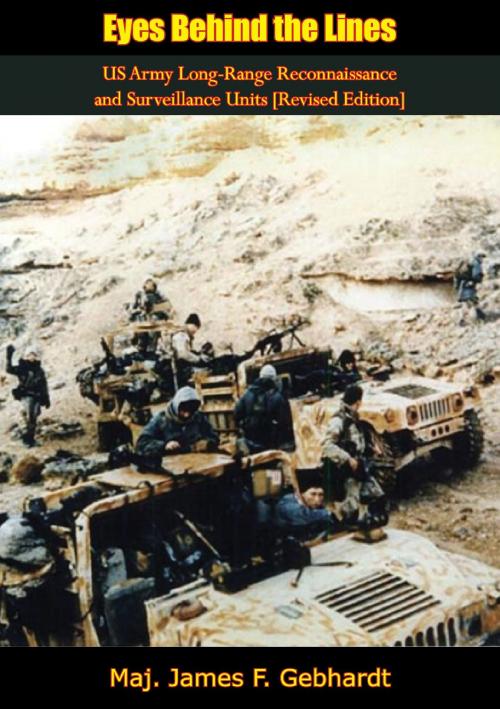Eyes Behind the Lines
US Army Long-Range Reconnaissance and Surveillance Units [Revised Edition]
Nonfiction, History, Military, Vietnam War, Asian, United States| Author: | Maj. James F. Gebhardt | ISBN: | 9781789121711 |
| Publisher: | Borodino Books | Publication: | April 3, 2018 |
| Imprint: | Borodino Books | Language: | English |
| Author: | Maj. James F. Gebhardt |
| ISBN: | 9781789121711 |
| Publisher: | Borodino Books |
| Publication: | April 3, 2018 |
| Imprint: | Borodino Books |
| Language: | English |
Eyes Behind the Lines: US Army Long-Range Reconnaissance and Surveillance Units is the 10th study in the Combat Studies Institute (CSI) Global War on Terrorism (GWOT) Occasional Paper series. This work is an outgrowth of concerns identified by the authors of On Point: The United States Army in Operation IRAQI FREEDOM. Specifically, these authors called into question the use of long-range surveillance (LRS) assets by commanders during that campaign and suggested an assessment ought to be made about their continuing utility and means of employment. This revision contains some important additional information the author received after this book was originally published.
Major (Retired) James Gebhardt, of CSI, researched and wrote this Occasional Paper with that end in view. In this study, Gebhardt surveys the US Army s historical experience with LRRP and LRS units from the 1960s Cold War and Vietnam War, through their resurgence in the 1980s and use in Operations JUST CAUSE and DESERT STORM, to the advent of the GWOT. The paper's analytical framework examines each era of LRS units in terms of doctrine, organization, training, materiel, leadership, and personnel. In doing so, the author makes a strong case for continuing the LRS capability in the Army s force structure.
The variety of environments and enemies likely to be faced by the military in the GWOT continues to demand the unique human intelligence abilities of trained and organized LRS units. As the Army leads the Armed Forces of the United States in combating terrorists where they live, the lessons found in this survey remain timely and relevant.
Eyes Behind the Lines: US Army Long-Range Reconnaissance and Surveillance Units is the 10th study in the Combat Studies Institute (CSI) Global War on Terrorism (GWOT) Occasional Paper series. This work is an outgrowth of concerns identified by the authors of On Point: The United States Army in Operation IRAQI FREEDOM. Specifically, these authors called into question the use of long-range surveillance (LRS) assets by commanders during that campaign and suggested an assessment ought to be made about their continuing utility and means of employment. This revision contains some important additional information the author received after this book was originally published.
Major (Retired) James Gebhardt, of CSI, researched and wrote this Occasional Paper with that end in view. In this study, Gebhardt surveys the US Army s historical experience with LRRP and LRS units from the 1960s Cold War and Vietnam War, through their resurgence in the 1980s and use in Operations JUST CAUSE and DESERT STORM, to the advent of the GWOT. The paper's analytical framework examines each era of LRS units in terms of doctrine, organization, training, materiel, leadership, and personnel. In doing so, the author makes a strong case for continuing the LRS capability in the Army s force structure.
The variety of environments and enemies likely to be faced by the military in the GWOT continues to demand the unique human intelligence abilities of trained and organized LRS units. As the Army leads the Armed Forces of the United States in combating terrorists where they live, the lessons found in this survey remain timely and relevant.















